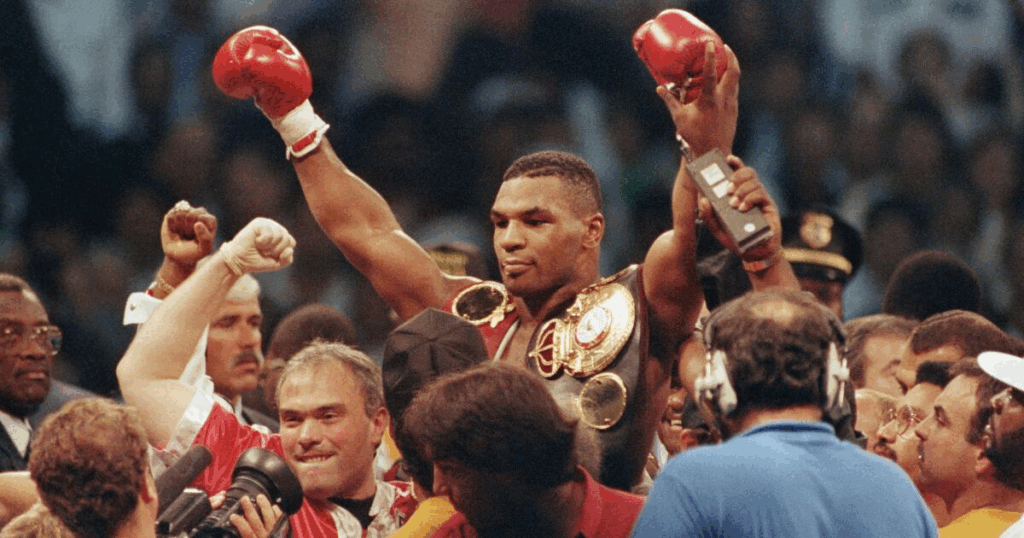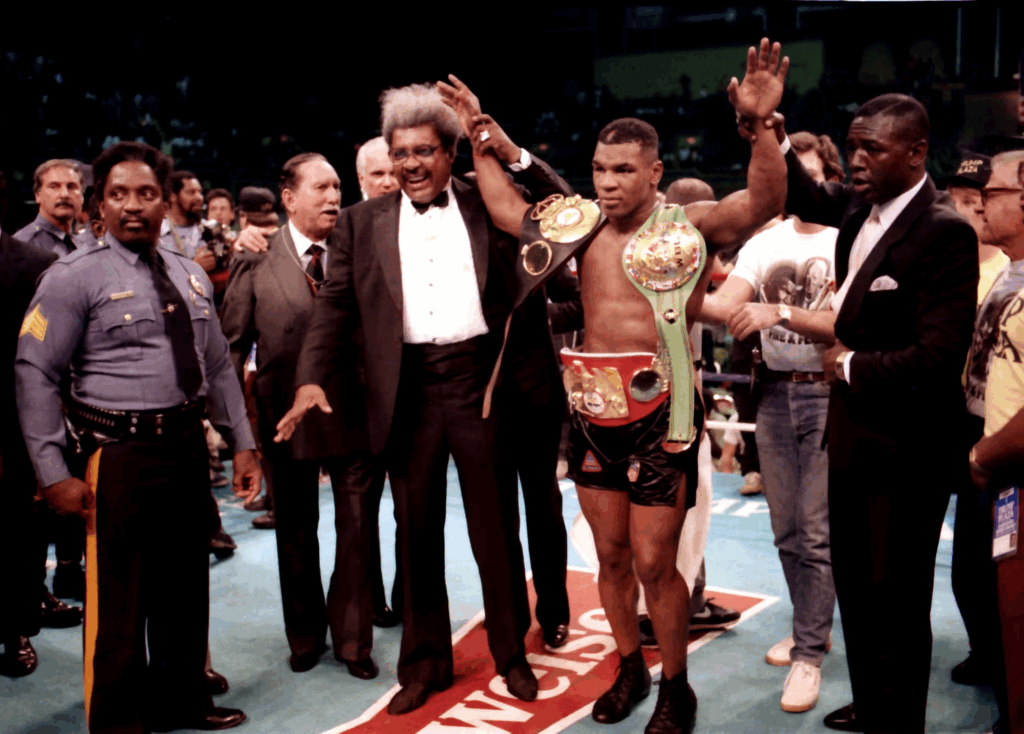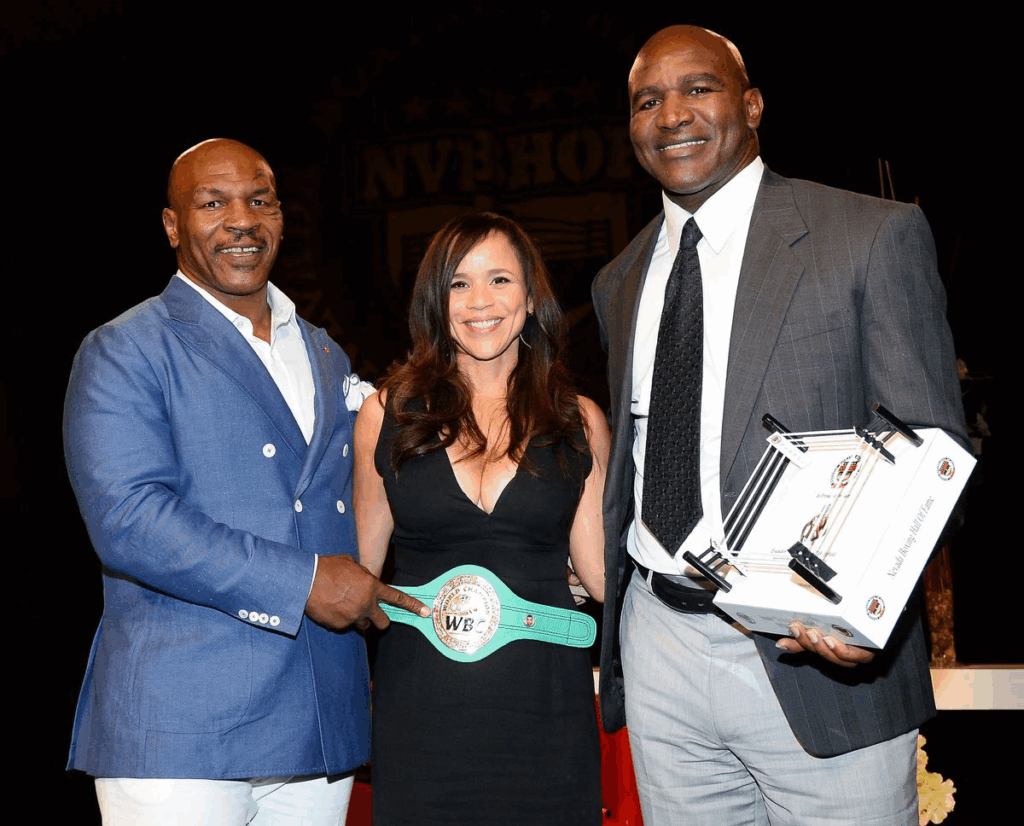
Record-Breaking Career
The Mike Tyson career is one that comprises tons of records which shocked the boxing world and made him an iconic hero of the sport. It is a testimony to his training, his natural gifts and his mental strength that he was able to overcome a troubled childhood and emerge as history’s most recent dominant fighter. Tyson didn’t just win, he reinvented the criteria for greatness.
Becoming the Youngest Heavyweight Champion
On November 22, 1986, at just 20 years and 4 months old, Mike Tyson defeated Trevor Berbick to win the WBC Heavyweight Championship, becoming the youngest heavyweight champion in boxing history. No one before him had ever captured a world heavyweight title at such a young age, and the record still stands to this day.
What made the achievement even more remarkable was the manner in which it was accomplished. Tyson entered the ring with a 27-0 record, most of those wins by knockout. His bout with Berbick ended in the second round after a devastating left hook sent the defending champion staggering to the canvas multiple times. It wasn’t just a win—it was a moment that changed boxing history.
This victory didn’t just earn Tyson a belt; it made him a household name. His youth, power, and ferocity captured the imagination of fans across the globe and marked the beginning of a new era in the sport.
Tyson’s Undefeated Streak Before His Loss to Buster Douglas
Before his shocking upset loss to James “Buster” Douglas in 1990, Tyson had built one of the most intimidating and unbroken winning streaks in heavyweight history.
Key highlights of his undefeated run:
- 37 consecutive wins, including 33 by knockout
- 15 first-round knockouts
- Unified the WBC, WBA, and IBF titles by the age of 21
- Defeated respected contenders such as Larry Holmes, Michael Spinks, Frank Bruno, and Tony Tucker
Tyson’s dominance during this period was so overwhelming that many fighters entered the ring already defeated in spirit. His combination of speed, strength, and psychological intimidation made him appear untouchable.
The loss to Douglas may have ended the streak, but it did nothing to diminish the legendary run that preceded it. That undefeated stretch remains one of the most feared and admired periods in boxing history.
Major Titles and Championships
Mike Tyson’s legacy was established around more than just powerful performances in the ring, as he achieved championship success in the grandest way possible. His acquisition, unification and defense of the heavyweight division’s most significant belts solidified his legacy as one of the greatest champions of all time. Tyson didn’t just win titles — he took them in brutal, imperious style.
WBC, WBA, IBF Heavyweight Titles
Tyson’s quest for undisputed dominance began with the WBC title, which he claimed on November 22, 1986, by knocking out Trevor Berbick. This victory made him the youngest heavyweight champion in history and launched a title run that would redefine the division.

He didn’t stop there. In March 1987, Tyson faced James “Bonecrusher” Smith and earned a unanimous decision victory to capture the WBA title. Although Smith managed to survive all 12 rounds, he offered little offense and was overwhelmed by Tyson’s control and power.
In August 1987, Tyson completed the trifecta by defeating Tony Tucker for the IBF title, becoming the undisputed heavyweight champion of the world. This historic achievement made him the first heavyweight to hold all three major belts—WBC, WBA, and IBF—simultaneously, an honor reserved for only the most elite fighters.
Tyson’s Long List of Victories
During his prime, Tyson compiled a series of emphatic victories that showcased his complete mastery of the heavyweight division. His opponents included former champions, undefeated contenders, and experienced veterans—many of whom were dispatched in the early rounds.

Notable victories include:
- Larry Holmes (1988) – Tyson became the first (and only) man to knock Holmes out.
- Michael Spinks (1988) – An undefeated champion, Spinks was knocked out in just 91 seconds.
- Pinklon Thomas, Tyrell Biggs, and Tony Tubbs – All fell before the third round under Tyson’s furious assault.
- Frank Bruno and Bruce Seldon (1996) – Comeback victories that earned Tyson the WBC and WBA titles once again.
In total, Tyson finished his career with 50 wins, 44 by knockout, many of them in the early rounds. His ability to consistently dominate and defeat high-level opponents solidified his status as a once-in-a-generation fighter. Tyson’s title reigns were short but unforgettable—marked by power, speed, and the raw intensity that made him a global icon.
Awards and Recognitions
Mike Tyson’s accomplishments extend well beyond the championships he won in the ring. His intensity, skill and cultural impact make his name legend among the best athletes ever. Tyson has received accolades from boxers and trainers and other boxing figures, including ranked fighter Oscar De La Hoya who considered Tyson to be the best ever.
Tyson’s Legacy in Boxing
Tyson’s history is one of supremacy, metamorphosis and enduring impact. He wasn’t just a champion — he was revolutionizing the way heavyweights fought. His early reign revolutionized the expectation of a power puncher, and his explosive style influenced an entire generation of fighters. Tyson, who revitalized the sport of boxing in the 1980s, packed venues and achieved staggering audiences every time he fought.

His impact can be measured in many ways:
- Youngest heavyweight champion in history (a record still unbroken)
- Undisputed heavyweight champion with all major titles
- One of the most feared and respected punchers in boxing history
- Ranked among the top heavyweights by outlets like The Ring and ESPN
Despite setbacks in his later years, Tyson’s name remains synonymous with raw talent and intensity. He showed the world how a fighter could combine physical gifts with mental strategy to dominate an entire division.
Recognition by Sports Media and Hall of Fame
Tyson’s accomplishments have been acknowledged by nearly every major sports and boxing institution:
- Inducted into the International Boxing Hall of Fame in 2011
- Inducted into the World Boxing Hall of Fame
- Named Fighter of the Year by The Ring magazine in 1986 and 1988
- Included in numerous “Greatest Fighters of All Time” lists by publications like Sports Illustrated, ESPN, and BoxRec

Beyond formal accolades, Tyson’s legacy lives on in documentaries, biopics, podcasts, and interviews where he reflects openly on both his triumphs and failures. His story continues to captivate audiences not just as a sports tale, but as a deeply human one.
Today, Tyson is not only remembered as a former world champion but also as one of boxing’s most enduring icons—flawed, complex, and ultimately unforgettable.
Cultural Impact
Mike Tyson’s impact exceeds that of the boxing ring. His status as a fighter is legendary, but his heart, his looks and his troubled life story established him as a global icon in popular culture. Tyson transcended the world of sports — he came to represent raw power, controvery and redemption. His visage and legacy are permanently imprinted within entertainment, fashion, music, and contemporaneous pop culture.
Tyson’s Influence Beyond Boxing
The tale of Tyson’s ascent from troubled youth to world’s youngest heavyweight champion spoke to millions. He was considered a personification of grit, passion and survival in reality. His back-then title of the “baddest man on the planet” wasn’t exclusive to boxing as much as it was to that spontaneous, out-of-control vibe that won over fight fans from all modes of everyday existence.

Even outside the ring, Tyson’s name carried weight. He influenced:
- Fashion – Known for his iconic black trunks, no-robe entrances, and tribal face tattoo, Tyson helped shape the minimalist, intimidating aesthetic that many athletes later emulated.
- Hip-hop culture – Tyson was frequently referenced in rap lyrics and became a symbol of dominance and street credibility in the music scene.
- Attitude and branding – Tyson’s aggressive persona influenced how fighters and athletes marketed themselves—as warriors, not just competitors.
Impact on Pop Culture and Media Appearances
Few athletes have made as seamless—and surprising—a transition into mainstream pop culture as Mike Tyson. Over the years, he reinvented himself through humor, humility, and unexpected appearances that introduced him to new generations of fans.

Notable highlights include:
- “The Hangover” (2009) – Tyson played a comedic version of himself in the hit film, gaining widespread praise for his self-awareness and willingness to parody his tough image.
- “Mike Tyson Mysteries” (2014–2020) – An animated adult comedy show where Tyson voiced a fictionalized version of himself, solving bizarre mysteries with a talking pigeon.
- Broadway show “Undisputed Truth” – Tyson’s one-man stage performance, directed by Spike Lee, offered raw and emotional insights into his life and career.
- Podcast and media presence – His podcast Hotboxin’ with Mike Tyson features celebrities, athletes, and thinkers, showing a more thoughtful, spiritual side of the former champion.
Tyson’s transformation from feared athlete to reflective media personality has redefined his legacy. He’s no longer just remembered for knockouts and controversies—but for resilience, reinvention, and the ability to remain relevant across decades. His cultural impact is enduring, proving that even the most volatile icons can evolve and continue to inspire.